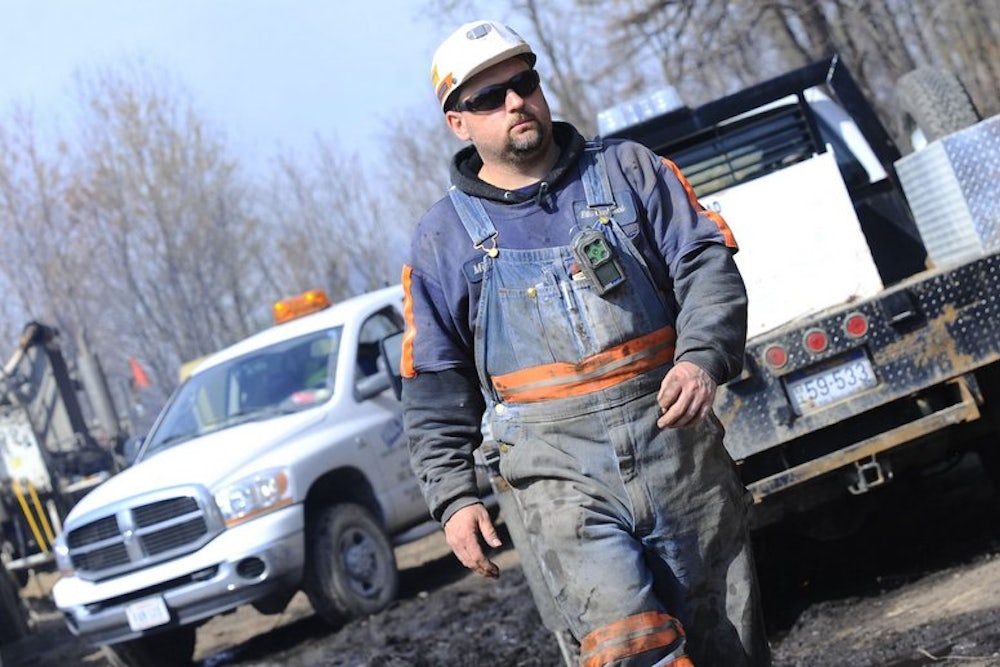When I drove to southern West Virginia a few weeks ago to watch Senator Joe Manchin defend his role in pushing gun-control legislation, I was struck to find that at the first of two town hall meetings he held, at the high-ceilinged Wyoming County Courthouse in tiny Pineville, he got not a single critical question about the gun bill. (Things were different at his next stop.) The people in Pineville had other things on their mind, including the plight of the retired coal miners whose health benefits are imperiled in one of the more remarkable tales of corporate gall to come down the pike in a while.
To recap quickly (fuller background is here): Peabody Energy, the largest coal company in the world and the inspiration for a great John Prine song, in 2007 created a separate entity called Patriot Coal and assigned it 13 percent of its coal reserves. Peabody also shifted over to Patriot 40 percent of its health care liabilities—the obligations for 8,400 former Peabody employees. A year later, Patriot was loaded up with even more weight when it acquired Magnum Coal, an offshoot of the second-largest mining company, Arch Coal. This left Patriot with responsibility for another 2,300 retirees, and liabilities of $1.37 billion. To nobody’s surprise, Patriot is now seeking Chapter 11 bankruptcy and saying it can’t afford to cover the health benefits of the 22,000 retirees and their spouses for whom it is responsible, most of whom never spent a day of their life working for something called Patriot Coal.
At the meeting, Manchin mentioned that he had, with fellow West Virginia Senator Jay Rockefeller, introduced legislation that would force Peabody to kick in money to help cover the retiree benefits it had sloughed off. And he minced no words in condemning the gambit. Peabody’s original carving off of Patriot, knowing it was setting it up to fail and take the retiree liabilities down with it, “wasn’t an honorable transaction,” he said. “It’s as simple as that. You can’t make that wrong a right… I don’t care what side of the [political] fence you’re on, if that’s not not right I don’t know what that is.”
Well, whether or not it was “right” in the eyes of those sitting in Pineville does not seem to have mattered in the court of law. On Thursday, a bankruptcy judge in St. Louis ruled that Patriot could indeed get out of $1.5 billion in retiree health-care obligations. As the Wall Street Journal reports: “The judge raised the issue [of Peabody’s motive in creating Patriot] but said it ultimately wasn't relevant to the question of whether Patriot needed concessions to survive, because it isn't clear whether Patriot will be able to recover any funds from either Peabody or Arch. 'Was Debtor Patriot Coal Corporation created to fail? Maybe not. Maybe,' the judge wrote.” As for those retiree benefits secured over decades of negotiations by the United Mine Workers of America, well, they were too generous to begin with, the judge wrote: “Unions generally try to bargain for the best deal for their members. However, there is likely some responsibility to be absorbed for demanding benefits that the employer cannot realistically fund in perpetuity, particularly given the availability of sophisticated actuarial analysts and cost trend experts.”
Ah yes, the “availability of sophisticated actuarial analysts and cost trend experts”! Funny, those same analysts have been warning us about something pretty alarming going on in the same part of the world in which many of these retired miners live: the life expectancy of working-class white women is falling, a startling trend that is being attributed to, among other things, long-term unemployment in whole swaths of the country. It’s pretty awful to contemplate, that in a time of ever-advancing medical science, a whole sector of Americans should be dying at an earlier age than before. Then again, who knows, those “sophisticated actuarial analysts and cost trend experts” might be able to find a bright side to the trend: Fewer retirees and retiree spouses means lower liabilities for coal companies!
The UMWA plans to appeal the judge’s ruling in federal court while it carries on negotiations with Patriot over what it might deign to kick into the severely underfunded “voluntary employees' beneficiary association” that would assume obligation for the offloaded health benefits. Manchin’s legislation stands little chance on the Hill. Protests against Peabody are expected to carry on into the summer. And companies across the country—in sectors far afield from coal—are surely taking note that a whole new way of evading basic responsibility for their workers has just gotten legal imprimatur as being, incredibly, within the realm of accepted corporate behavior.
Alec MacGillis is a senior editor at the New Republic. Follow him @AlecMacGillis
